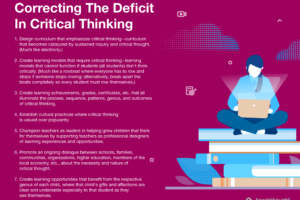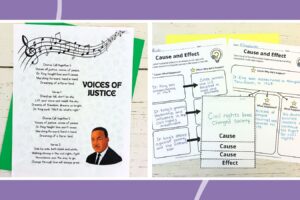
Important Study Skills for High School Students and How to Teach Them
30
By the time high schoolers enter your classroom, they’ve had several years of homework assignments, research projects, and subject exams. But have they mastered studying and staying organized?
Teaching study skills to high school students is a vital part of their secondary education, and these lessons can benefit them long after graduation. Discover how to instill study skills like goal setting, time management, and monitoring progress in your teenage students. Find classroom resources that guide them (and you) through this important process!
1. Setting Goals
High school students may have long-term goals like going to college and getting their dream job. But do they know how short-term goals help them achieve these objectives? Model how to set goals for high schoolers by having them make goals based on their study habits.
Each Monday, have students write or discuss their weekly goals in your class, including finishing all their classwork or getting a particular grade on a test. Include goal-setting in their homework, such as “Finish taking notes on Chapter 5” or “Read for 20 minutes without getting distracted.” Have students reflect on their goals at the end of the week or the period. How did they do, and what would they change?
Get students thinking about their study habits
A lesson on study skills for high schoolers starts with self-regulation and self-assessment. Teach your students how to set goals, keep their work organized, and take diligent notes with guided resources and graphic organizers.
Student Guide to Organization, Note-taking, and Study Skills
By Lifelong Learning
Grades: 7th-10th
Help high schoolers get past procrastination and set attainable goals with a thorough resource on study skills and executive functioning. With a number of organization handouts, study skills self-assessments, and goal-setting worksheets, this unit sets students up for success in any subject area.
2. Making Priorities
One of the most important life skills activities for high school students is making priorities for their work. If they’ve always been taught to check off a task list from beginning to end, now’s your chance to help them prioritize their work!
Assign projects that include non-linear steps, such as research assignments that require multiple sources, or book reports with several steps. Have individuals, pairs, or the whole class work together on putting the needed steps in order of priority, such as due dates or time needed to complete. You can mix up your homework as both one-night and several week-long assignments, and encourage students to make similar lists for their nightly homework to ensure the highest-priority work gets finished first.
3. Managing Time
Do your high schoolers really know how long five minutes is? What about two days, or even a week? Teach teens the value of a minute with time management resources that make them both aware and attuned to the time they’ll need to complete an assignment.
For your first long-term project, encourage guided time management with mini-deadlines for students to meet along the way. Remove these smaller deadlines as the year progresses until students can finish a project independently. If they need more support, model time management strategies in class, including how to properly pace themselves during tests and how to finish a short assignment with time to spare.
4. Improving Focus
Between 21st-century technology and the distractions of everyday life, teenagers find it harder than ever to properly focus on their work. Help them improve focusing skills by creating a distraction-free learning environment in your classroom and by keeping your class schedule structured into smaller tasks.
Challenge high schoolers to finish shorter, timed assignments to train their focus over a longer period of time. You can also encourage them to practice healthy habits to improve their focus, such as getting more sleep and staying hydrated. You can also avoid over-decorating your learning space to minimize distractions.
Train focusing skills to ensure student success
How well can your students focus on the task at hand? Work on this important study skill for high school students with guided practice, specialized assignments, and resources that directly connect their focusing skills with scholastic success.
How to Focus Better Study Skills Lesson-Middle/High School- Google Slides option
By School Counseling Essentials
Grades: 6th-12th
Show students how distractions can impact their study habits with a resource that puts the focus on focus itself! With a learning style survey, a worksheet on distractions, and walking gallery posters on both internal and external distractions, this set of classroom materials is helpful for both high achievers and students struggling to focus in class.
5. Taking Notes
Asking high schoolers to take notes on their reading feels like second nature, but in many cases, they’ve never been taught to take proper notes. Whether you prefer outlining notes, charting notes, or the Cornell note system, taking students through this process can immediately improve their learning experience.
Before you assign your first informational reading assignment, model how to take notes with a whole-class activity. Show students how to summarize main ideas, discern between important facts and less important details, and have them work together to take notes on a straightforward reading assignment. Have them practice taking lecture notes, technical notes, and notes on any other topic in class to work on skills that will ultimately make them better readers and students.
Hone note-taking skills in any subject
Whether you teach ELA, social studies, science, or any other content-heavy subject, taking concise notes is a valuable skill that high schoolers need to know. Add resources and lessons on note-taking to a unit on study skills for high schoolers, and let them understand how helpful high-quality notes can really be!
Focused Note-Taking Lesson/Templates/Graphic Organizers-High School Study Skills
By Jenn Liu — Engaging to Empower
Grades: 8th-12th
Subjects: English Language Arts, Informational Text, Reading Strategies
Standards: CCSS RI.9-10.1, 2; CCRA.R.1, 2, 4, 5, 7, 10; CCRA.W.4, 5; CCRA.SL.1, 2, 3
Need your students to know the basics of note-taking? Show high schoolers how to take focused notes with a CCSS-aligned resource that includes a Google Slideshow, editable discussion questions and assignments, and note-taking templates in both print and digital formats.
6. Staying Organized
If you’ve ever looked inside an average high schooler’s backpack, you know that staying organized isn’t a strong skill for many. Help them learn the value of organization with a classroom structure that lends to individual organization, and keeps them accountable to staying organized in each aspect of their education.
A list of upcoming deadlines and assessments is a great first step to teaching organization as part of a lesson on study skills for high school students. Collect work regularly and check student calendars and planners to ensure they’re writing down assignments. You can even make regular backpack checks part of a classroom exit ticket, and reward students who are keeping their work clean and organized.
Make organization an engaging part of education
Staying organized doesn’t have to be a chore! Use incentives and classroom feedback to instill organizational skills into students of all learning styles, reading levels, and grades. You may even find that your classroom stays neater from period to period!
Study Skills Curriculum, High School SPED BTS Organization Activities, Counselor
By Angie Kratzer
Grades: 6th-12th
Teach high schoolers to keep their work organized long before the first assignment is due. This helpful study skills resource includes a learning style inventory, tip sheets, a struggles scavenger hunt, and more to guide students through the benefits and strategies of improving their organization skills.
Organization Skills Activities and Study Skills for Middle and High School
By Informed Decisions
Grades: 6th-12th
Standards: CCSS W.9-10.1, 2a, 3, 4; CCRA.L.4, 5, 6
How organized are your high schoolers? Let them assess and improve their own organizational skills with a resource that includes an organization and study skills tips handout, facilitation tips, an educator guide, and an activity reflection handout, all available in both color and black and white.
7. Reflecting on Progress
The reflection process might be the most important part of a lesson on high school study skills. It allows students to decide what tactics are working for them, determine what skills they still need to improve, and directly connect study skills and executive functioning to their success in class.
Have them take a self-assessment on study skills during the first week of school, and create a process in which they reassess these skills periodically throughout the year. Consider assigning a final project in which students present on the skill they’ve improved the most, including higher grades or a happier learning experience as evidence!
More Study Skills for High School Students
Once you’ve taught teens the core study skills, focus on additional concepts that can help them reach their goals. These study skills may include:
- Asking teachers or adults for help
- Test-taking strategies
- Setting up your work area
- Using flashcards or digital review programs
- Checking your work or finding peer editors
- Signing up for peer tutoring
- Creating study groups
The most important study skills for high school students are the ones that work for their learning style. That’s why knowing their learning preferences and needs should be the first step of any study skills lesson, and the specific strategies can then follow.
Make study skills part of your school schedule with TPT
Even though your high schoolers are teenagers, they may not know how to be students quite yet. Teaching study skills to high school students helps them become more acquainted with their own learning style and teaches them habits they’ll use in and outside the classroom. Find more high school study skills resources to reinforce these important concepts, and help high schoolers take the next successful steps into the rest of their lives.
Source link








